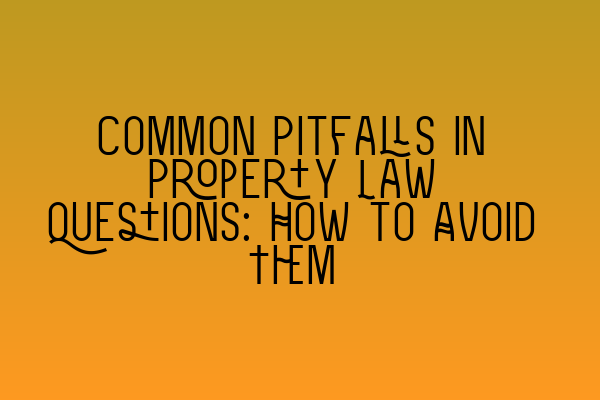Common Pitfalls in Property Law Questions: How to Avoid Them
Property law is a complex and ever-evolving field that requires a deep understanding of legal principles and regulations. Whether you’re a student preparing for the SQE Property Law exam or a practitioner navigating real estate transactions, it’s important to avoid common pitfalls in property law questions. By gaining awareness of these pitfalls and adopting effective strategies to avoid them, you can enhance your chances of success and ensure that your answers are accurate, precise, and comprehensive.
1. Lack of Knowledge of the Relevant Laws and Regulations
One of the most common pitfalls in property law questions is a lack of knowledge of the relevant laws and regulations. It’s crucial to familiarize yourself with the key legislation that applies to the specific issue at hand. Whether it’s the Land Registration Act, the Law of Property Act, or the Housing Act, having a strong foundation in these laws will give you a solid starting point for answering property law questions.
It’s also essential to stay up-to-date with recent developments in property law. Legislation and case law evolve over time, and it’s important to be aware of any new statutes or landmark judgments that may impact your analysis of property law questions. Regularly reviewing legal journals, articles, and legal updates will help you stay informed and avoid outdated information in your answers.
2. Failure to Analyze the Facts in Detail
Another common pitfall in property law questions is the failure to analyze the facts in detail. Property law often requires a careful examination of the specific circumstances and factual background of a case or scenario. By thoroughly understanding the facts, you can provide a more accurate and well-reasoned analysis.
When faced with a property law question, take the time to read and analyze the facts carefully. Identify the relevant parties, the nature of their interests, any agreements or contracts involved, and any pertinent legal obligations. Avoid making assumptions or jumping to conclusions without considering all the relevant details. This level of attention to detail will demonstrate your analytical skills and strengthen the overall quality of your answer.
3. Neglecting to Address Ancillary Issues
Property law questions often involve ancillary issues that may impact the outcome of a case or transaction. Failing to address these ancillary issues can lead to an incomplete or insufficient answer. Therefore, it’s crucial to consider all the potential factors that may influence the resolution of the problem at hand.
For example, in a question about a lease agreement, you may also need to consider issues such as misrepresentation, breach of contract, or the obligations of the parties during the term of the lease. By identifying and discussing these ancillary issues, you can demonstrate a more comprehensive understanding of property law and provide a more nuanced and complete answer.
4. Inadequate Use of Legal Authority
Effective use of legal authority is essential in property law questions. While legal principles are important, supporting your arguments with relevant statutes, case law, and academic commentary adds depth and credibility to your answer.
When addressing property law questions, make sure to cite and discuss relevant legal authorities that support your analysis. This demonstrates your ability to apply legal principles to real-world scenarios and substantiates your arguments. Be sure to stay up-to-date with recent cases and influential judicial decisions that may have an impact on the area of property law you are studying or practicing.
5. Insufficient Exam Technique
Even if you have a strong understanding of property law and can analyze the facts effectively, poor exam technique can hinder your performance. It’s important to develop good exam technique to maximize your potential and present your answers in a clear, organized, and concise manner.
Start by carefully reading the question, making note of any specific issues or sub-questions that need to be addressed. Plan your answer before writing, ensuring that you have a logical structure and coherent flow of arguments. Use headings, subheadings, and paragraphs to improve the readability and organization of your answer.
Remember to stay focused and answer the question directly. Avoid unnecessary tangents or irrelevant information that may confuse the examiner. By presenting your answer in a well-structured and organized manner, you can enhance the clarity and effectiveness of your response.
Conclusion
Avoiding common pitfalls in property law questions is crucial for success in the SQE Property Law exam or in the practice of property law. By familiarizing yourself with the relevant laws, analyzing the facts in detail, addressing ancillary issues, using legal authority effectively, and developing strong exam technique, you can enhance your chances of providing accurate, well-reasoned, and comprehensive answers. Remember to stay updated with recent developments in property law and continuously improve your knowledge and skills to excel in this complex and dynamic field.
Related Articles:
- Misrepresentation in Contracts: Unveiling Deceptive Practices
- A Closer Look at SQE Contract Law Syllabus
- SQE Contract Law: Analyzing Landmark Cases and Influential Judicial Decisions
- Understanding Contractual Capacity: Rights and Limitations
- Interactive SQE Mock Tests for Contract Law: Test Your Knowledge
